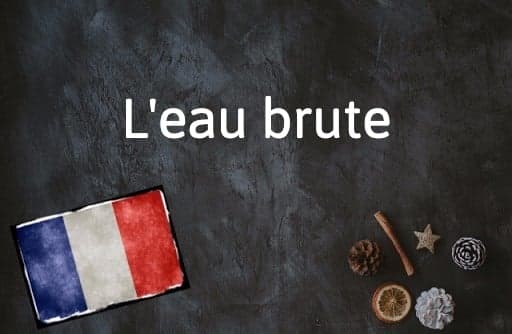French Expression of the Day: L’eau brute

It might sound like a perfume, but you probably won't smell better after spraying this on your body
Why do I need to know l’eau brute ?
Because you might soon be getting notices about this through your door, especially if you are a gardener.
What does it mean?
L’eau brute – pronounced low broot - might look like savage water, or hard water to the English-speaker at first glance but it literally translates to ‘raw water.’ However, the easiest way to understand this is that it is non-tap water.
The water that comes out of your tap (robinet) is considered ‘l’eau traité’ (treated water).
And you might need to understand the difference if France's summer drought continues - authorities in northern Corsica have announced rules around using both tap and non-tap water (l’eau brute) to water outdoor spaces.
'Raw water' is not sewage, it's just water that has not been treated and doesn't come from the tap - for example if you have a well or spring in your garden then that's l'eau brute.
In principle, l’eau brute comes from a water supply source that belongs to the commune or local authority - even if the well or spring is on your property - therefore local authorities can create rules around drawing from these sources, especially during periods of extreme drought.
Use it like this
Ainsi, pour l'eau brute (issue d'un captage ou d'un forage), la préfecture a décidé d’allonger la durée de l’interruption d’arrosage hebdomadaire de 24 heures à 36 heures. – Thus, for raw water (either from a catchment or well/borehole), local authorities decided to extend the weekly watering hiatus from 24 hours to 36 hours.
Il est dangereux de boire de l'eau brute, car elle n'a pas encore été traitée et peut contenir des bactéries ou des produits chimiques dangereux. – It is not safe to drink non-tap water, as it has not yet been treated and could contain harmful bacteria or chemicals.
Comments
See Also
Why do I need to know l’eau brute ?
Because you might soon be getting notices about this through your door, especially if you are a gardener.
What does it mean?
L’eau brute – pronounced low broot - might look like savage water, or hard water to the English-speaker at first glance but it literally translates to ‘raw water.’ However, the easiest way to understand this is that it is non-tap water.
The water that comes out of your tap (robinet) is considered ‘l’eau traité’ (treated water).
And you might need to understand the difference if France's summer drought continues - authorities in northern Corsica have announced rules around using both tap and non-tap water (l’eau brute) to water outdoor spaces.
'Raw water' is not sewage, it's just water that has not been treated and doesn't come from the tap - for example if you have a well or spring in your garden then that's l'eau brute.
In principle, l’eau brute comes from a water supply source that belongs to the commune or local authority - even if the well or spring is on your property - therefore local authorities can create rules around drawing from these sources, especially during periods of extreme drought.
Use it like this
Ainsi, pour l'eau brute (issue d'un captage ou d'un forage), la préfecture a décidé d’allonger la durée de l’interruption d’arrosage hebdomadaire de 24 heures à 36 heures. – Thus, for raw water (either from a catchment or well/borehole), local authorities decided to extend the weekly watering hiatus from 24 hours to 36 hours.
Il est dangereux de boire de l'eau brute, car elle n'a pas encore été traitée et peut contenir des bactéries ou des produits chimiques dangereux. – It is not safe to drink non-tap water, as it has not yet been treated and could contain harmful bacteria or chemicals.
Join the conversation in our comments section below. Share your own views and experience and if you have a question or suggestion for our journalists then email us at [email protected].
Please keep comments civil, constructive and on topic – and make sure to read our terms of use before getting involved.
Please log in here to leave a comment.